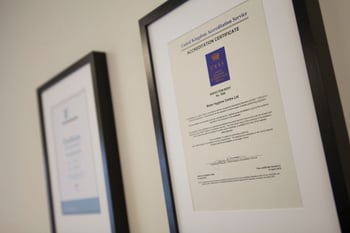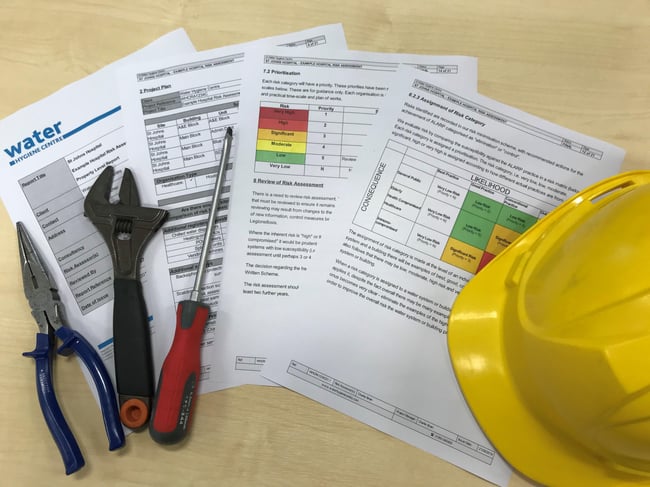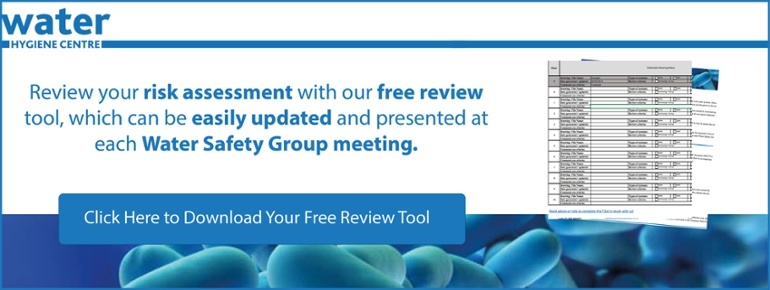Identifying and assessing risks is the first key to good health and safety management. In the Legionella industry the risk assessment is no different, and a requirement under the HSE’s Approved Code of Practice L8 and COSHH regulations.
Who should complete your Legionella Risk Assessment?
Legionella risk assessments can be carried out by the Duty Holder or an employee, but in most cases they are carried out by an external contractor or consultancy. Similar in what they are both trying to achieve (identifying risks), but their content and quality will vary. One such inclusion, should be – what actions are to be taken to control the risks identified, which can be in the form of a minimisation scheme or action plan. As well as recommending a scheme of control, a minimisation scheme or action plan will contain a list of prioritised remedial works, such as, cold water storage cistern cleaning or removal of blind ends. But who should carry out these works?
Why should you have separate individuals or suppliers?
The next action of the Duty Holder or ‘Responsible Person’ is to find a suitable, competent person to carry these out. Traditional options are either an internal employee, i.e. a member of the estates team, or employing the services of a contractor. A simple, attractive solution may be to ask the external contractor who carried out the risk assessment if they can, or if they know of anyone who can. In theory, this may seem an efficient and cost saving exercise, but this approach represents risk of their own.
Employing the same person or company to carry out both tasks of identifying the risks and subsequently eliminating or reducing them, presents the opportunity for bias or vested interest. In other words, the poacher has turned game keeper.
Although there seems to be advantages for Duty Holders to employ this consistent approach, mainly financial and ease of contact, there are many disadvantages of being led in this way, here are some to be mindful of:
- The actions raised to minimise the risk may not be proportionate to the risk and therefore may be ‘over the top’ to what was expected;
- Both the risks highlighted and the following remedial carried out will still need managing and ‘signing off’ internally;
- Frequencies of recommended system monitoring may not be appropriate and therefore an unnecessary cost. For example, inspecting cold water storage cisterns monthly or even cleaning them unnecessarily;
- Cheap prices for a legionella risk assessment sounds appealing, but the same company know that what they recommend will be actioned by them, a chance to cash in perhaps?
- The risk assessor may not be impartial and may be rewarded via commission for the follow up work, do they have a vested interest?
 In an industry where user and patient safety is paramount, this process should not be led by financial gains and what seems easier. The risks highlighted in a risk assessment are the organisations risks and should be managed accordingly by the person responsible for them. Too often has this responsibility been wrongfully placed on the contractor and a false sense of security gained, both the risks and the following actions are the responsibility of the Duty Holder. Thankfully, there are steps and advice to take to help Duty Holders with this dilemma:
In an industry where user and patient safety is paramount, this process should not be led by financial gains and what seems easier. The risks highlighted in a risk assessment are the organisations risks and should be managed accordingly by the person responsible for them. Too often has this responsibility been wrongfully placed on the contractor and a false sense of security gained, both the risks and the following actions are the responsibility of the Duty Holder. Thankfully, there are steps and advice to take to help Duty Holders with this dilemma:
- A British Standard for Legionella Risk Assessment (BS 8580-1:2019) is in place that details the needs for independence and impartiality;
- Accreditation's such as ISO/IEC 17020:2012 ensure risk assessment companies have safeguards in place to ensure independence and impartiality;
- Formation of a Water Safety Group to help share the load of managing water safety, such as how to deal appropriately with known risks;
- Independent advisors such as an Authorising Engineer [Water] to help take the right course of action
.
As much as it seems appealing to employ a ‘one stop shop’ to manage all water hygiene management activities for an organisation, the problems encountered are well known. So, before a decision is made to employ one external contractor to carry out both a Legionella Risk Assessment and also undertake the actions arising from it, ensure there are stringent controls in place to guarantee the impartiality of any recommendations made and the appropriateness of any actions taken. One easy way to help this is to keep these activities separate.
Feel free to reach out if you have any questions about the issues mentioned above or if you would like to consult with one of our experts on water hygiene.
Editor’s Note: The information provided in this blog is correct at date of original publication – June 2021
© Water Hygiene Centre 2021









